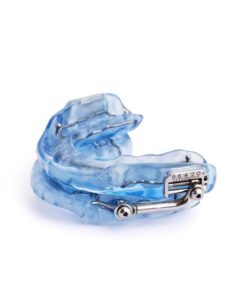16 May Oral Appliance Therapy to Treat Sleep Apnea
 The term of sleep apnea is used by many people who struggle to get a good night’s sleep, wake up frequently, snore or generally believe that they are dealing with this condition because someone suggested this might be their problem.
The term of sleep apnea is used by many people who struggle to get a good night’s sleep, wake up frequently, snore or generally believe that they are dealing with this condition because someone suggested this might be their problem.An official diagnosis of sleep apnea requires a sleep study be performed under controlled circumstances. Sleep apnea is a serious condition where the individual literally stops breathing, or their breathing is so shallow during a period of sleep, and their sleep cycles can be interrupted hundreds of times every night.
Lack of sleep is attributable to poor performance at school or on the job, accidents, poor health, and even weight gain. For patients dealing with sleep issues, there are steps that can be taken before investing in a sleep study. A visit to your dentist might provide a solution that many patients never consider.
There might be underlying reasons for poor sleep, such as stress, diet and lack of exercise. However, for many it is the positioning of the jaw that results in the muscles in the back of the throat relaxing, resulting in the collapsing of the airway.
When the airway is blocked and the patient stops breathing, they involuntarily awaken (often subconsciously) and reposition so the airway is unblocked until it happens again. This can repeat over and over again every night.
One possible solution is the SomnoDent MAS™. This is an oral snoring appliance which fits over the upper and lower teeth much like a sports mouth guard. However, there are differences between a generic mouth guard you might acquire at the drug store and a clinically tested medical device obtained through your dental provider.
The precision needed to hold your jaw in a certain position to aid in treating obstructive sleep apnea is not achievable with just any mouth guard. Your dentist, however, has the tools required to fabricate this mouth guard that has been proven to be effective in most cases in stopping snoring and treating obstructive sleep apnea for patients suffering from sleep issues in the mild to moderate range.
In addition to the mouth guard, other suggestions you can try include sleeping on your side, avoiding caffeine and alcohol for several hours before bed and, if overweight, losing a few pounds might help.
Call us today to schedule an appointment with our dental team and discuss your treatment options!
